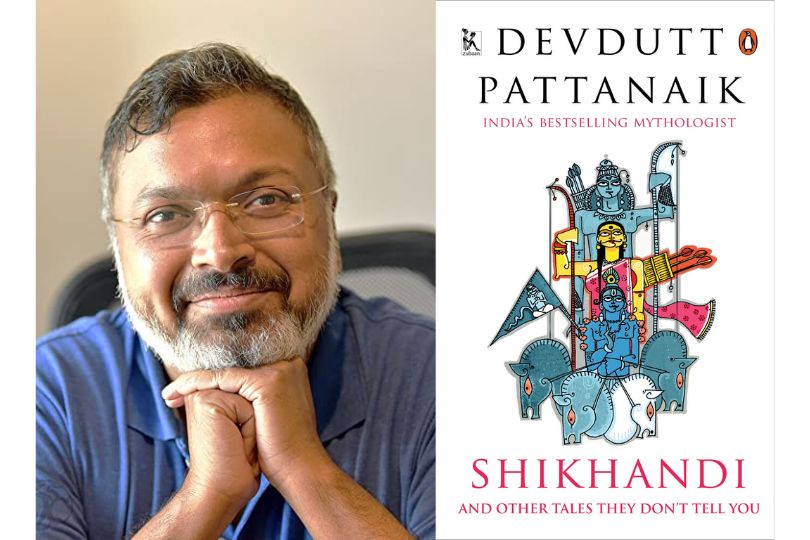Interview With Author Devdutt Pattanaik, Translator of Shikhandi And Other Queer Tales They Don’t Tell You
This book is a celebration of stories narrated by our ancestors. These stories are rarely retold publicly as they seem to challenge popular notions of normalityon Jun 14, 2023

Dr Devdutt Pattanaik is a physician whose varied interests later turned him into a well-known mythologist and an author on the topics of mythology, sanctity and so on. His famous books on mythology include The Book of Ram, Myth = Mithya: A Handbook of Hindu Mythology, The Pregnant King, The Book of Kali, Jaya: An Illustrated Retelling of The Mahabharata, Sita: An Illustrated Retelling of The Ramayana.
Frontlist: How did you first become interested in the idea of exploring queer themes in ancient Indian mythology, and what inspired you to write this book?
Devdutt: What inspired me was the realisation that it such few people, even amongst scholars, who did not know these queer stories. It took 20 years of research to compile them and retell them.
Frontlist: In your book, you cover a range of queer tales from Indian mythology. How did you select the specific stories that you included, and how did you ensure they aptly represent queerness in ancient times?
Devdutt: This book is a celebration of stories narrated by our ancestors. These stories are rarely retold publicly as they seem to challenge popular notions of normality. I have no control over political propaganda. I have no control over a reader’s perception. Dirt is ultimately an invention of culture.
Frontlist: Please share your thoughts on how queerness has been represented in different cultures throughout history, and what common threads you see across these cultures?
Devdutt: Queer stories are not restricted to Indic mythology. These stories make their way in one form or another. They come to us from The Inuit mythology in the Arctic regions, Aztec mythology, Cuban Santeria, Viking mythology, ancient Egyptian mythology, Japanese Shinto mythology, Chinese Taoist mythology, Mesopotamian mythology, Sumerian Epic of Gilgamesh Greek poems and even Native American tribes.
Persian mythology introduces us to the Devil, Ahirman, the evil-one, who has anal sex with himself, thus producing a host of demons. This idea had a major influence on Biblical mythology that emerged in the Near East. Christianity and Islam are unambiguous in their condemnation of all things queer, from cross-dressing to homosexuality.
Frontlist: How has the traditional Indian cultural perspective towards queer individuals evolved over time, and how does it compare to contemporary attitudes?
Devdutt: If you take a close look at the vast written and oral traditions in Hinduism, some over two thousand years old and you will find many overlooked tales. They are those of Shikhandi, who became a man to satisfy her wife; Mahadeva, who became a woman to deliver his devotee’s child; Chudala, who became a man to enlighten her husband; Samavan, who became the wife of his male friend. There are many more such stories. Because we realised many people did not identify Shikhandi with queerness, we abandoned the subtle approach and made things very explicit.
I think these stories are not told for many reasons. It may be because they are linked with embarrassment. It could be because people do not know how to explain them. Or simply, these stories cause disgust within the minds of some. Some fear it will make us question established notions of gender and sexuality. Although Indian philosophy celebrates the fluid, Indian society is increasingly becoming rigid. The conservatives feel threatened by Westernisation and modernisation. It could also be because many educated Indians feel powerful in making fun of all things Indian, especially Hindu.
Frontlist: How can we establish a connection between identifying as queer and the concept of karma? Additionally, do you adhere to the ideology that our current existence is a result of our karma?
Devdutt: Sanatana Dharma believes in karma, whatever we were in our past lives was the fruit of karma. We have not chosen our body, we have not chosen our sexual nature either. This nature comes, and then we have to handle it in the society. We can say that it is the fruit of karma. Who knows what is the fruit of good karma or the result of bad karma?
Some heterosexual people do not have children, though being heterosexual they ought to have children. But this is not always the case. We find in the scriptures that there was a king who had three wives, but no children. In the same way, no sage is interested in household life. How can we identify the karmic reasons for any of these cases?
Frontlist: In the context of ancient cultural and religious perspectives, how was the notion of sexual fluidity regarded and understood?
Devdutt: The idea of the queer is very much part of Buddhist, Jain and Hindu philosophy.
In Hindu mythology, Shiva is more masculine and Vishnu is more feminine. In Vishnu stories, Ram is very masculine while Krishna is androgynous. So the rigid and fluid balance each other.
In Buddhist mythology, “pandakas” or homosexuals were not allowed to be monks. So there was discrimination in Buddhism. But no one talks about this, as we prefer to imagine Buddha as secular and inclusive, which is not quite true.
Jain monks differentiated between ‘dravya shareer’, which is your physical body, and your ‘bhaav shareer’, which is your psychological body — that which attracts you to things.
One does not have to be queer to include the queer; Ram is not queer, but he includes the queer. That is the idea.
Frontlist: What key features of this book make it a valuable resource for those interested in exploring the origins of queerness?
Devdutt: Myths cannot be broken. Misconceptions can be diluted. This book seeks to expand mind with more stories and information. It asks you to question and create ideas.



.jpg)






.jpg)

.jpg)
.jpg)
.jpg)
.jpg)

.jpg)

.jpg)









Sorry! No comment found for this post.